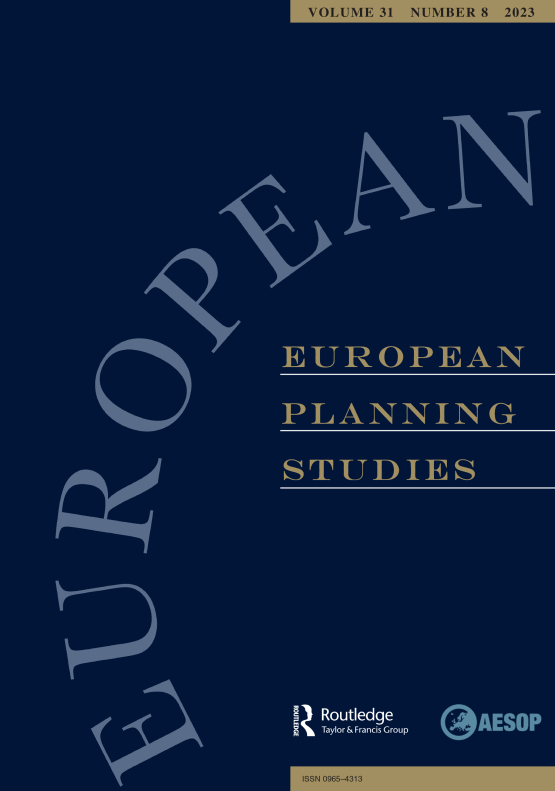Submit a Manuscript to the Journal
European Planning Studies
For a Special Issue on
Territorial injustice and the fabric of wellbeing in left-behind regions
Manuscript deadline

Special Issue Editor(s)
Sebastien BOURDIN,
EM Normandie Business School
sbourdin@em-normandie.fr
Bogdan Ibanescu,
Alexandru Ioan Cuza University of Iasi
Ibanescu.bogdan@uaic.ro
Hans Westlund,
KTH Royal Institute of Technology
hans.westlund@abe.kth.se
Territorial injustice and the fabric of wellbeing in left-behind regions
In recent years, growing concern for spatial justice, territorial cohesion and regional disparities has prompted renewed academic and policy interest in so-called “left-behind” regions (Rodríguez-Pose, 2018; Pike et al., 2024). These include deindustrialised towns, rural areas in socio-economic transition, and peripheral regions marked by demographic decline or political marginalisation. At the same time, research on wellbeing and quality of life has concentrated on metropolitan contexts, where indicators of prosperity and subjective wellbeing are most often developed and applied (Mouratidis, 2021). As a result, the lived experiences of wellbeing in left-behind places remain insufficiently explored, despite an emerging literature that highlights their social, emotional and symbolic specificities (MacKinnon et al., 2022; Panori et al., 2025).
This special issue seeks to address the existent gap by bringing together planning studies that examine how wellbeing is understood, pursued, and potentially transformed in structurally disadvantaged regions with the aim not to idealise these places, but to recognise the diversity of their trajectories and the significance of their voices in broader debates on post-growth futures and territorial justice.
Wellbeing is increasingly recognised as a multidimensional and spatially dependent concept, shaped by economic indicators and social, affective, cultural and ecological dimensions (Dolan et al., 2008; Ballas, 2021). In contrast to dominant frameworks that assess wellbeing through urban-centric metrics and individual-level data, emerging research stresses the importance of contextual and territorial factors, including place attachment, symbolic recognition, environmental quality and access to care, in shaping how people understand and experience the “good life” (Graham, 2017; Panori et al., 2025).
Despite the ongoing evolution, substantial gaps remain. The interplay between subjective wellbeing and territorial injustice in structurally disadvantaged areas is still insufficiently theorised, especially in regions marked by demographic decline, infrastructural disconnect, and socio-political invisibility (Pike et al., 2023; Rodríguez-Pose et al., 2024; Hertrich & Brenner, 2025). Moreover, the capacity of such territories to generate alternative, place-based pathways to wellbeing (grounded in collective memory, intergenerational solidarity, ecological embeddedness, or everyday forms of care) remains underexplored (Abreu et al., 2024).
This special issue seeks contributions that explore how wellbeing is imagined, lived, measured and contested in left-behind regions. We encourage critical, interdisciplinary, and empirically papers that expand the conceptual and methodological boundaries of wellbeing studies and regional research. Submissions may address, but are not limited to, the following themes:
- Territorial inequalities, symbolic disinvestment and lived experiences of abandonment
- The emotional geographies of wellbeing: from resentment to rootedness
- Place attachment, memory, and identity as affective infrastructures
- Rethinking wellbeing indicators for peripheral and non-metropolitan spaces
- Socio-ecological dimensions of the “good life” in left-behind, shrinking or rural regions
- Methodological innovations to capture subjective and relational wellbeing
- The role of local institutions and agency in enabling or constraining wellbeing futures in left-behind places
References:
Hertrich, T. J., & Brenner, T. (2025). When the past becomes the future: The challenges of policies in ‘Left Behind’places in East Germany–A case study from the Gera region. Regional Science Policy & Practice, 17(8), 100195.
Mouratidis, K. (2021). Urban planning and quality of life: A review of pathways linking the built environment to subjective well-being. Cities, 115, 103229.
Abreu, M., Comim, F., & Jones, C. (2024). A capability-approach perspective on regional development. Regional Studies, 58(2), 123–136. https://doi.org/10.1080/00343404.2023.2294567
Ballas, D. (2021). The economic geography of happiness. In K. F. Zimmermann (Ed.), Handbook of labor, human resources and population economics (pp. 1–24). Springer. https://doi.org/10.1007/978-3-319-57365-6_188-1
Dolan, P., Peasgood, T., & White, M. (2008). Do we really know what makes us happy? A review of the economic literature on the factors associated with subjective well-being. Journal of Economic Psychology, 29(1), 94–122. https://doi.org/10.1016/j.joep.2007.09.001
Graham, C. (2017). Happiness for all? Unequal hopes and lives in pursuit of the American Dream. Princeton University Press.
Green, A., Shuttleworth, I., & MacLeavy, J. (2022). Spatial inequalities and left-behind places: Rethinking policy narratives. Territory, Politics, Governance, 10(2), 141–157.
Panori, A., Kalogeresis, A., Papastergiou, E., Ziogas, T., & Ballas, D. (2025). Unraveling the nexus: Subjective well-being and left-behind places. Regional Science Policy & Practice.
Pike, A., Béal, V., Cauchi-Duval, N., Franklin, R., Kinossian, N., Lang, T., ... & Velthuis, S. (2024). ‘Left behind places’: a geographical etymology. Regional Studies, 58(6), 1167-1179.
MacKinnon, D., Kempton, L., O’Brien, P., Ormerod, E., Pike, A., & Tomaney, J. (2022). Reframing urban and regional ‘development’for ‘left behind’places. Cambridge Journal of Regions, Economy and Society, 15(1), 39-56.
Rodríguez-Pose, A. (2018). The revenge of the places that don’t matter (and what to do about it). Cambridge Journal of Regions, Economy and Society, 11(1), 189–209.
Rodríguez-Pose, A., Bartalucci, F., Lozano-Gracia, N., & Dávalos, M. (2024). Overcoming left-behindedness. Moving beyond the efficiency versus equity debate in territorial development. Regional Science Policy & Practice, 16(12), 100144.
Submission Instructions
Full papers (max. 9,000 words - everything included: figures, diagrams references etc.) should be submitted by the 30th, November 2025.
When submitting their papers, authors will be asked if their paper is part of a Special Issue. They should tick “yes” and select the Special Issue “Territorial injustice and the fabric of wellbeing in left-behind regions” from the drop-down menu.
Informal inquiries and abstracts (max. 500 words) may be sent to the guest editors:
- Sebastien BOURDIN, EM Normandie Business School, sbourdin@em-normandie.fr
- Bogdan Ibanescu, Alexandru Ioan Cuza University of Iasi, Ibanescu.bogdan@uaic.ro
- Hans Westlund, KTH Royal Institute of Technology, hans.westlund@abe.kth.se

